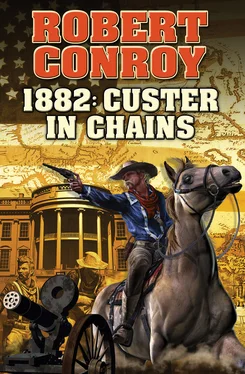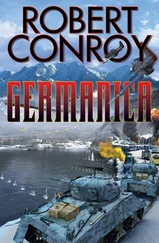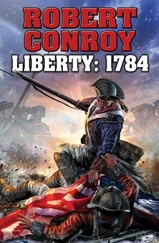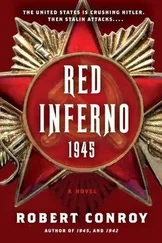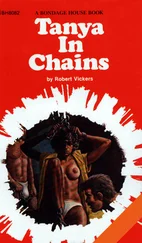Robert Conroy - 1882 - Custer in Chains
Здесь есть возможность читать онлайн «Robert Conroy - 1882 - Custer in Chains» весь текст электронной книги совершенно бесплатно (целиком полную версию без сокращений). В некоторых случаях можно слушать аудио, скачать через торрент в формате fb2 и присутствует краткое содержание. Год выпуска: 2015, Издательство: Baen, Жанр: Альтернативная история, на английском языке. Описание произведения, (предисловие) а так же отзывы посетителей доступны на портале библиотеки ЛибКат.
- Название:1882: Custer in Chains
- Автор:
- Издательство:Baen
- Жанр:
- Год:2015
- ISBN:нет данных
- Рейтинг книги:3 / 5. Голосов: 1
-
Избранное:Добавить в избранное
- Отзывы:
-
Ваша оценка:
- 60
- 1
- 2
- 3
- 4
- 5
1882: Custer in Chains: краткое содержание, описание и аннотация
Предлагаем к чтению аннотацию, описание, краткое содержание или предисловие (зависит от того, что написал сам автор книги «1882: Custer in Chains»). Если вы не нашли необходимую информацию о книге — напишите в комментариях, мы постараемся отыскать её.
1882: Custer in Chains — читать онлайн бесплатно полную книгу (весь текст) целиком
Ниже представлен текст книги, разбитый по страницам. Система сохранения места последней прочитанной страницы, позволяет с удобством читать онлайн бесплатно книгу «1882: Custer in Chains», без необходимости каждый раз заново искать на чём Вы остановились. Поставьте закладку, и сможете в любой момент перейти на страницу, на которой закончили чтение.
Интервал:
Закладка:
“Perhaps not directly,” said Campoy, “but you could be guilty of negligence, which is both a crime and a sin.”
Bernardi looked at the two men. “I know what you’re doing,” he said. “You’re trying to cover yourselves for the time when the Americans take over Havana.”
To his surprise, Villate laughed. “Of course, you fool. I do not wish to be hanged by either the United States for atrocities, or by our weak King Alfonso for having lost his precious Cuba. If you are thinking that you will be blamed at least in part for the debacle that is coming, then you are absolutely correct. I strongly urge you, if you wish to survive, to change your way of doing things. In short, no more executions. At least none without my express permission.”
“I understand,” said Bernardi.
Campoy leaned forward. “And if you have them on you, I will take those so-called credentials.”
* * *
“A fleet,” Secretary of State James Blaine exulted. “We’ve captured a bloody fleet. Now we can go on and take more of Spain’s decaying empire.”
The telegram from Cuba had just come in announcing that five Spanish cruisers were now in American hands. The public, of course, had found out about it too. There were no secrets in Washington and newspapers were already trumpeting the news that a Spanish fleet in Cuba had surrendered to an American fleet. The battle had been brief and there had been no American casualties, which made the triumph even more exciting. All throughout the nation’s capital, church bells were ringing and throngs of people were gathering around the White House. Fireworks displays were planned for the evening in Washington, New York and other major cities. More than a victory, it was a hope that the now heartily disliked war would soon be over. The Washington Post said that an American noose was tightening around the throats of Spain and Cuba. Blaine thought the prose was a little too florid but otherwise liked the sentiments.
Blaine and the others were in Blaine’s office in the State, War, and Navy Building just west of the White House. Blaine, along with Vice President Chester Arthur and the Secretaries of Navy and War, had chosen this site for their meeting to avoid the annoying presence of Libbie Custer. Her demands for negotiating or winning the release of her husband were becoming more and more strident, and there were growing concerns about her mental stability.
“Five small ships is hardly a fleet,” said Arthur drily. “And besides, what other Spanish properties would you wish us to annex?”
“The Philippines and Guam come to mind,” Blaine said cheerfully. “Without a navy, the Spaniards can’t very well defend them from us, can they?”
“Nor could we hold them, even if we managed to take them,” responded Naval Secretary William Hunt. “Those lands are thousands of miles away and have been under Spanish rule for centuries. We would have to send our ships halfway around the world on a journey that could take as long as four months each way. You forget that almost all of our warships are in the Atlantic, and not the Pacific. Maybe someday we’ll build a canal across the Isthmus of Panama, but right now that’s nothing more than an engineer’s fantasy.”
Arthur agreed with Hunt. “If we send what navy we have across the Pacific, we would have no ships here to protect us from European predators. England could take the Philippines from us in an instant, while France could exact a bloody vengeance if she so wished. We are a long ways from being a great power, although having a modern navy would be a major step forward.”
“So too would a canal across the Isthmus,” said Hunt.
Blaine was forced to agree, but he had further grand ideas. “Then we must have a two-ocean navy. If Great Britain can have a navy scattered all over the earth, then we surely must be able to have real squadrons in both oceans and not the handful of relics we currently possess. Gentlemen, we are entering into a new era of American power. If we are going to be a serious player on the world stage, then we must possess the tools.”
“Don’t you mean props?” the vice president chided gently. “All of that will cost money. If our new colonies turn out to be a fiscal drain, the voters will turn against us in a heartbeat.”
Secretary of War Lincoln added. “We are already paying a price. More than a thousand of our young men are dead with at least twice that many wounded, and the fever season is just beginning. I will grant you that these numbers are tiny in comparison with the great battles of Gettysburg, Shiloh, and elsewhere, but those were many years ago and today’s numbers represent real people whose death must mean something in order to be justified.”
“A price must be paid for an empire,” said Blaine dismissively. “But what if I suggest a free entry to our Pacific empire? I’m thinking, of course about Hawaii. It’s been said that the islands are incredibly lovely, but they are ruled by a backward tribal hierarchy. We have a treaty with them that grants the islands favored status for trading, but the Americans who have settled there have been agitating for something better. I suggest we give them their wishes. I also suggest that we take the islands before someone else does.”
Hunt smiled. Such a bloodless conquest would legitimize his plans for an expanded navy. “We could take the islands with the small and old warships we have out there, and utilize only a regiment or two of volunteers from California to overwhelm the islanders. Then, of course, we would need to establish and maintain bases in or around their major city, Honolulu. I understand there are marvelous anchorages available. I think Hawaii would definitely be a start in the Pacific and, better, I do not believe Hawaii has any history of fever.”
Blaine was pleased. A mere dot on the map of the world was better than no dot on the map. He would get the United States a foothold in the vast Pacific and Hunt would get further justification for his improved and expanded navy.
* * *
The usually ill-tempered Nelson Miles angrily pushed the piece of paper across the table to General Hancock. General Couch, who had already read it, showed no expression. He already had a fair idea what Hancock’s decision would be.
Miles, however, wanted his thoughts heard. “Clara Barton may be the closest thing we have to an American saint, but the idea that we would send aide to the enemy is preposterous. I acknowledge that they are only asking for ether and other medical supplies and not weapons, but any Spanish soldier healed through the use of an anesthetic could soon be fighting against us.”
“I disagree with that assumption,” said Couch. “Any soldier operated on now is not going to be fighting us for a goodly long time, if ever, given the terrible wounds that modern weapons can inflict. Giving them medical supplies is something that might just serve us well in a post war environment. A little mercy shown now could pay dividends down the road.”
General Hancock had been astonished to receive a letter from Clara Barton reminding him that the Red Cross was an international organization and that the United States was honor and treaty bound to adhere to the terms of the Geneva Convention. While sending medical supplies to an enemy to treat their wounded was not specifically mentioned, she firmly felt that it fell within its terms.
Hancock took the letter and handed it to an aide. “I’m not surprised they are suffering shortages. Our blockade and siege have been fairly effective. Some food might be smuggled in, but not ether or other medications. Therefore, we shall supply it to them. According to Miss Barton’s letter, they have enough for only a week or so. I propose that we agree to send them some in just about a week.”
Читать дальшеИнтервал:
Закладка:
Похожие книги на «1882: Custer in Chains»
Представляем Вашему вниманию похожие книги на «1882: Custer in Chains» списком для выбора. Мы отобрали схожую по названию и смыслу литературу в надежде предоставить читателям больше вариантов отыскать новые, интересные, ещё непрочитанные произведения.
Обсуждение, отзывы о книге «1882: Custer in Chains» и просто собственные мнения читателей. Оставьте ваши комментарии, напишите, что Вы думаете о произведении, его смысле или главных героях. Укажите что конкретно понравилось, а что нет, и почему Вы так считаете.
